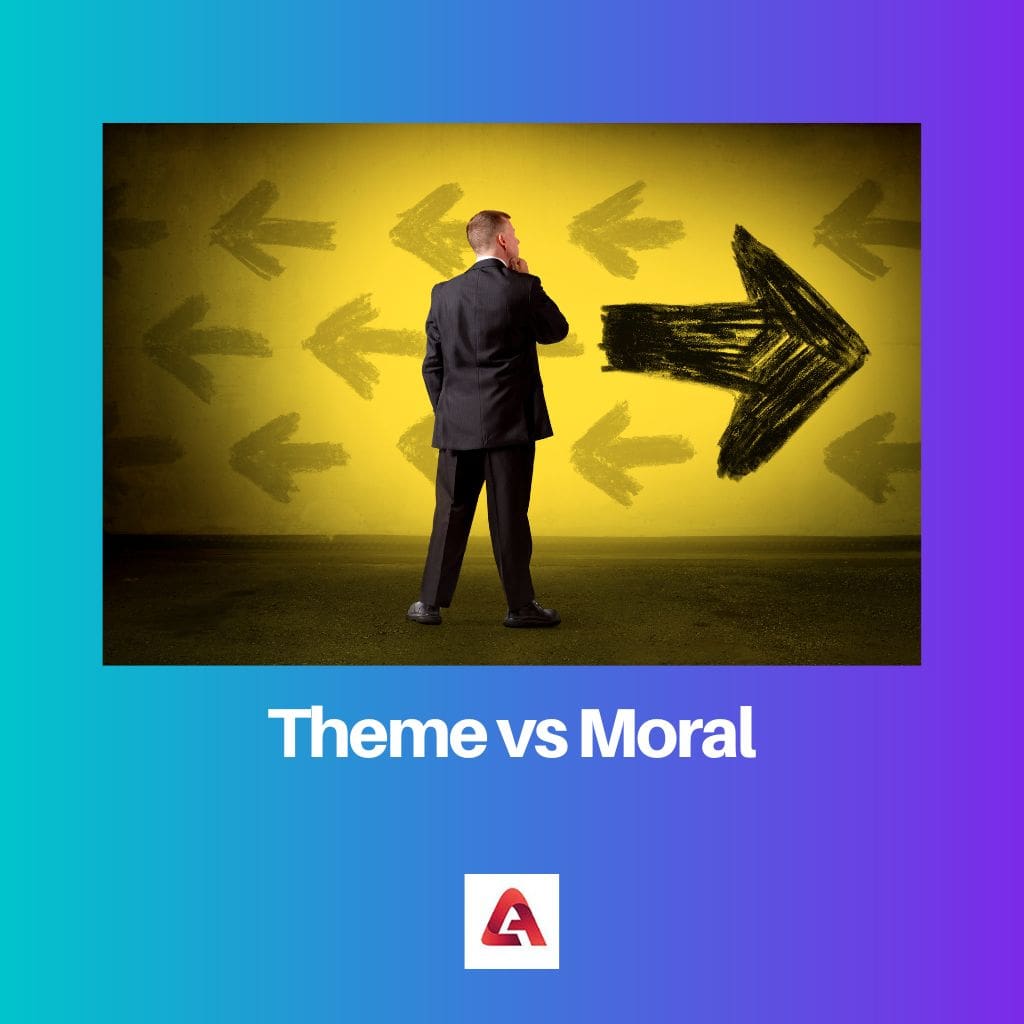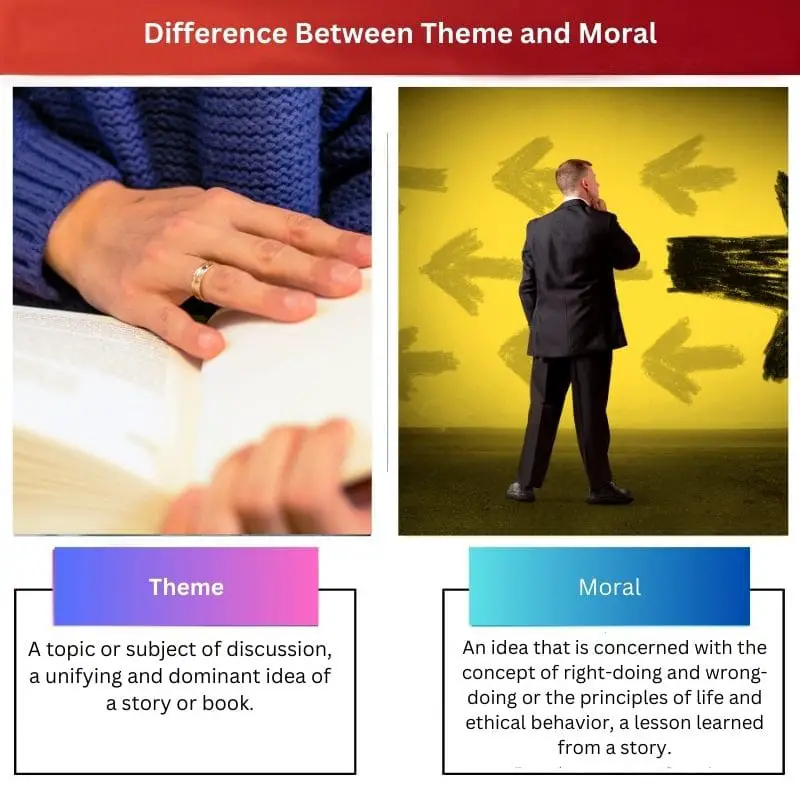A story, a fictional work, or an artwork is based on a theme, a plot, a setting, and a moral that makes the story run. May it be a theme or a moral, both have their significance and purposes for serving.
Although the theme and moral are overlapping concepts, they have a fine line between them. However, there is a vast difference between them.
Key Takeaways
- A theme is an underlying message, idea, or subject explored in a literary work, serving as a unifying element that connects various aspects of the story.
- A moral is a specific lesson or teaching that a story conveys, guiding how to behave or make decisions in life.
- While both theme and moral contribution to the meaning of a story, a theme is more abstract and pervasive, whereas a moral offers a concrete lesson or principle.
Theme vs. Moral
Theme is the overarching message or idea conveyed through a work of literature, abstract concepts or universal truths. It is expressed through the actions, thoughts, and words of the characters. Moral is a message about right or wrong, good or bad, and what actions should be taken.

The moral of a story can be the story’s theme, but vice versa is not necessarily true.
Comparison Table
| Parameter of Comparison | Theme | Moral |
|---|---|---|
| Dictionary definition | A topic or subject of discussion, a unifying and dominant idea of a story or book. | An idea that is concerned with the concept of right-doing and wrong-doing or the principles of life and ethical behavior, a lesson learned from a story. |
| Purpose | The theme of a story tells the basic idea behind the story. | To teach the reader about a real-life principle. |
| Appearance in the story | Appears several times in the story through characters, plots, etc. | The moral of the story comes at the end of the story. |
| Stating | The story’s theme is not directly stated but is identified through understanding. | The story’s moral is stated in the end; however, nowadays, authors may or may not state the moral. |
| Identification | The theme is identified through repeated occurrences and words. | The moral is confined to a statement. |
What is the Theme?
A theme is a central topic of discussion in the story and is the most important part of a story. It is the concept on which the work is based and progresses; in other words, it is a pattern followed throughout.
A single story may have multiple themes. A theme appears several times throughout the story and is depicted in the story through characters, plots, and the setting.
The story’s theme is identified through its characters and plots, through the recurring occurrence of the words and sentences.
What is Moral?
The story’s moral is a lesson learned from it or a message conveyed through it. The moral is the idea concerning the right and wrong things, the principles to be followed in life, and the ethical behavior one should have.
Usually, a story has one moral that is explained throughout the story. The story’s moral is stated at the end and is a single-lined statement conveyed.
The morals in the stories of the storybooks for children play an important role in their developmental process since they don’t have a perception of their own in the early years of their life.
Nowadays, authors prefer not to state morals in the story and leave it for the readers to understand. Therefore, the writings of the current times depend more on the reader’s understanding.

Main Differences Between Theme and Moral
- The purpose of the theme is to develop the story on its line, while the purpose of the moral is to teach the reader or convey a lesson to the reader; it teaches a person about what is right and what is wrong, about the principles of life, about the ethical behavior that a person should have.
- A story can have multiple themes but a single moral.

I didn’t realize how vital the distinction between theme and moral is in a story. It really makes you think about the underlying elements of storytelling.
Certainly, this discussion on theme vs. moral brings a new level of appreciation to literary works.
Agreed. The uniqueness of their purposes and their roles add depth to the narrative structure.
I find it fascinating how both the theme and moral play a significant role in the story. It’s interesting to see how the theme is not directly stated but is identified through understanding.
I agree, the depth and complexity of these literary elements enrich the reading experience.
Absolutely, the intricate balance between the theme and moral is what makes a story thought-provoking.
The detailed comparison between theme and moral serves as a valuable guide for interpreting stories effectively. It truly enhances the reader’s engagement.
I couldn’t agree more. Exploring the nuances of themes and morals adds layers of meaning to the storytelling experience.
The in-depth examination of themes and morals in literature adds a layer of intellectual richness to the narrative. It allows readers to engage with the stories more deeply.
Absolutely, this discussion enriches our understanding of storytelling and the underlying concepts that drive narratives.
The nuanced differences between themes and morals have opened a new realm of literary interpretation for readers. This exploration is intellectually stimulating.
Indeed, discerning the intricate details of themes and morals expands our literary perspective.
The insightful exploration of themes and morals provides readers with a deeper appreciation of the underlying messages within stories. It’s intellectually stimulating.
Absolutely, gaining a better understanding of themes and morals enriches our interpretation of literary works.
I concur. Delving into the intricate elements of storytelling enhances the overall reading experience.
The profound exploration of themes and morals breathes new life into literature. It highlights the artistic complexity of storytelling in a remarkable way.
Absolutely, this discourse on themes and morals provides valuable insights for readers and scholars alike.
Placeholder
I believe the aspect of morals and themes plays a significant role in shaping the reader’s perspective. The purpose of each element adds layers to the overall story.
Indeed, understanding the differences between theme and moral enhances the reader’s engagement with the narrative.
This discussion about the intricacies of the theme and moral in storytelling offers a fresh insight into the complexities of narratives. It’s truly enlightening.
Absolutely, engaging with the theme and moral enriches the reading experience and fosters a deeper understanding of the author’s intent.
I completely agree. Learning about these nuances adds a new dimension to the interpretation of literary works.